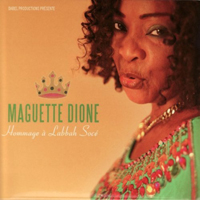
MAGUETTE DIONE
HOMMAGE A LABBAH SOCE (Dabel Productions, Senegal)
I am still bugged by download CDs: I often find ones I've downloaded and not unpacked, or listened to but lost track of, like the excellent Maguette Dione, which would have been reviewed favorably sooner had I received a hard copy. But, as it is published in Dakar it's not likely to turn up in the local bins, no matter how hard I look. It's not earthshaking but it's certainly worthwhile. Other than "El Divorcio," the Arsenio classic, all titles are in Wolof, however you will notice the obligatory "Manisero" among other familiar riffs (in "Khol Ma Ni Maye Wayé"). Since she has been called "The Celia Cruz of Africa," (probably more for her looks than her voice) Maguette kicks off with an homage to that late bewigged lady. (OK, that was ungallant, I take it back.) Though it's apparently a new album the sound quality reminds me of those Lassissi salsa albums we all covet which are delivered in two track stereo with little mid-range and heavy bass. While this is Maguette's first solo album, she has performed with other Senegalese salseros, visited Cuba and played with Buena Vista as well as Orquestas Sublime and Aragon. She has sung with Monguito and been backed by Alfredo de la Fé. She now lives in France. She was featured on 6 albums by Thierno Kouyaté and two by Nicholas Mennem and his Super Sabador. "Li Ngay Wout Mingui Thi Mane" really cooks along. The title-cut, "Hommage à Labbah Socé," kicks out the jambs and from there on the second half of the disc is smoking.
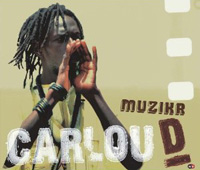
CARLOU D
MUZIKR (WorldVillage 450013[s])
This is a fine set of mellow jazz-inflected Senegalese ballads, interspersed with straight-up Mbalax, for those who miss the energy that used to be manifest by Youssou Ndour, Baaba Maal etc in their youth. Carlou is a former member of the Senegalese rap group Positive Black Soul, but this traditional music is more to my taste. Youssou does make a guest appearance, a sort of Papal sanction for the youngster who is also a devotee of Cheikh Ibra Fall, beloved of the Mouride sect. They duet on "Gorée," an over-the-top folk ballad about the infamous point of departure for slaves. The message is that the Africans themselves were not blameless in this trade. (Read Mungo Park's Travels for an eye-opening account of how savage the natives were, even fighting and capturing slaves for sale between rival villages.) The faster tracks, like "Meun nako def," really fire it up. The last three cuts are the strongest: a fiery "Yaaboyo" with tama, scrapers, electric guitar, kora, &c, is outstanding.
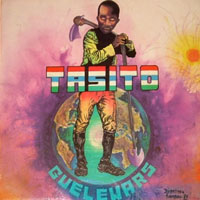
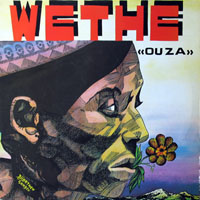
SENEGAL FLASH
By an odd coincidence I put on an old favourite CD the other night: Senegal Flash: Banjul, part of a series of Senegalese oldies published by Syllart in 1995. It has three well-known tracks on it: "Jalo" by Etoile de Dakar, "Litti Litti" by Star Band Number One, and "Doomou baaye," a Baobab number familiar from Bamba. But some of the other tracks jump out: those by Ouza and Guelewar in particular. A net search revealed that 48 tracks from the Senegal Flash series are available (since Jan 20, 2011) for download on Amazon. If you can stand the quality of the Amazon MP3s, which are downsampled to 256 kbps like iTunes, then you can put together a decent compilation from all this material. You presumably have the Baobab and Etoile de Dakar material which has been reissued numerous times, and probably all the Number One stuff too (which came out on three CDs from Dakar Sound and then a double disc from Syllart in 2010), but that leaves at least two really stellar bands, Ouza and Guelewar, for your excitement and delectation. There's also Super Diamono (with 3 tracks) and Ifang Bondi (formerly the Super Eagles) who have 5 tracks scattered throughout; however their leader Babou Jobe claimed they never got paid for this material from Sylla. There's a great track by Super Diamono called "Yamate nelaw," and for no comprehensible reason I suddenly thought of "In a broken dream" by Python Lee Jackson, a song buried deep in my subconscious, but one of the great early 70s stoner guitar solos. Though this cut -- "Yamate nelaw"-- is not in the reissued set, there are lots of Super Diamono albums out there, since both Omar Pene & Ismael Lo went on to fame.
The original Senegal Flash issue consisted of six CDs: I bought four and skipped two that had a little too much programmed drums and synthesizer. Two of the original albums, Kaolack & Ndar are reissued just as they came out 15 years ago. The others have been abridged. Typical of Sylla he adds a few tracks and changes the names of others to make you think you don't have it, but I have fallen for that trick before.
Guelewar's great track on Banjul, "Tasito," is the title cut of a French LP. They are a fine outfit and discogs.com lists three albums by them. And three excellent tracks from "Tasito" were included in the Flash series: the title cut, and the B-side, "Djaraama," and "Kele Fasane." The title track from their third album, "Warteef Jigeen," is also included along with "Mamadu Bitike" from the same album (Disafrique DARL 007). Also, on Ndar, from their "Sama Yaye Demna N'Darr" disc comes the title cut and "Njarama." These seven excellent tracks are well worth hearing though only 3 are currently on amazon. Leader Moussa Ngom later joined Super Diamono, further popularizing the Afro-Manding sound. Another Gambian, Laba Sosseh, became a huge star in Senegal with his purer version of the Cuban sound.
From Ouza comes nine tracks & to my surprise there are 20 tracks by him available on amazon. "Wethe (Solitude)" (mis-spelled here) came out in 1980 on Jambaar Productions. "Bayina music" is also drawn from that disc. "Nobel" was a single and presumably a big hit. It has a weirdly high women's chorus but is a very catchy ballad with good sax. The fame that followed Pape Seck and Youssou escaped Ouza (a.k.a. Ousmane Diallo) because of his overtly political songs which were often banned from the airwaves.
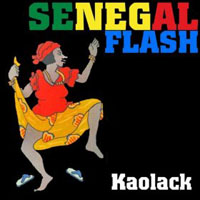
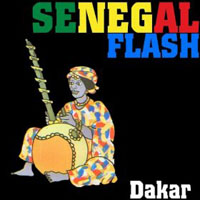
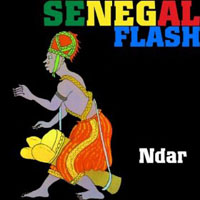
Senegal Flash: Kaolack (same as Syllart CD 38905 2)
This kicks off with the moving "Xam Xam" of Ifang Bondi; "Bouba" by Ouza is another great track. Orchestra Sahel's "Bamba" is a bit shrill, or perhaps it's the harsh recording. Named for the club they played in, Sahel included Cheikh Tidiane Tall, singer Sedina Wade, and Idrissa Diop. The soul & jazz influences are most evident in their work. The exquisite Star Number One tracks (with Yakhya Fall's haunting guitar) and "Man kouma xol" by Etoile de Dakar (classic mbalax from Youssou) must be in everyone's collection by now. "Douniya" by Ouza brings a balafon to the uptempo groove. A solid set.
Senegal Flash: Dakar
I didn't buy this one originally because the Coumba Gawlo tracks mostly have too much synth on them, except "Seytaane" which is decent. But anyone interested in Senegalese music will want to check them out along with Souleymane Faye for the second tier of mbalax bands after the Star Bands and Etoiles. ("Sogui" by Souleymane Faye is his best entry.) The original "Dakar" had fourteen tracks; two by Cheikh Lo, and two more negligible ones from Soulemane Faye & Pape Djiby Ba. The best track on here is "Reuw Reuss" by Mamadou Maiga if you are cherrypicking.
Senegal Flash: Ndar (same as Syllart CD 38906 2)
I have a post-it on my CD, left over from my DJ days, awarding three stars to half the tracks on here, and four stars to Star Number One's latin groover "Mathiaki." Pape Seck's killer cut is called "Macakki" on Number One de Number 1. Next to the opening cut, "Mamadou Bitique" of Guelewar I've written "Kicks in at 8'" because it's a long 12-minute track and takes its time getting to the point. Their "Sama yaye demna Ndar" rocks out for almost 8 minutes. "Autorail" by Baobab was on Bamba, the Stern's compilation; beside MG Experience Thiaroye I wrote "poor sound, good cut," and next to Super Diamono's "Muugn" it says "OUCH synth!" Ifang Bondi's "Xaleli Africa" got two stars and the note "reggaefied rock." The Ouza and Guelewar tracks rated highest with me, despite the synth on "Adouna."
Senegal Flash: Louga-Kaolack
(This set is a reissue of two Ouza tracks from the original Louga CD, two that are duplicated on the Kaolack CD plus three other tracks: Two by Cheikh Lo ("Bamba Bakh" has synth overload) were on Dakar, & "El Carretero" of Eric Mbacke N'Doye which is on Dakar Sound volume 1, Etoile 2000.
Senegal Flash: Ziguinchor
The original had an extra track from Cheikh Lo "Doxamden"; again the Mamadou Maiga track stands out, as well as Cheikh Lo's "Africadem."
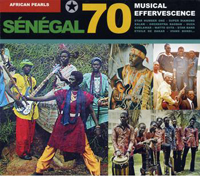
AFRICAN PEARLS
SENEGAL 70: MUSICAL EFFERVESCENCE (Syllart)
It's time for that little game I love to play called reviewing a CD I don't have. It's out in Europe as a two-disc set from Sterns at 15 quid for 26 songs, and this time you can download individual songs for 79 pence (which is currently a bit more than a Yankee greenback). The sound samples on amazon.uk were a bit raunchy so I presume they have not come from an original source, but like the MP3s and some discs I have, were burned from used vinyl. It's a spectrum of 70s Senegalese bands, and the next question is would you rather listen to a whole Baobab or Etoile de Dakar album or do you want them chopped up and rearranged like appetizers on a shiny aluminium platter? I suppose the point is, if there was enough good unreleased material by either Baobab or Etoile de Dakar then a separate disc would be warranted, but this is really just the leftovers.
Star Number One kicks things off with "Faran Tamba"; they also serve us "Senegal Jambar," "Suma Dom ji," "Mory," and "Kery Goro." Their cohorts Star Band de Dakar offer "Guethe," "Gossando," & "Senegambia"; and then there's the star offspring Etoile de Dakar who deliver "Tolou Badou Ndiaye," "Footane" & "Hombre Misterioso" -- and before we forget them there's Etoile 2000 with the classic "Boubou Ngary." From Baobab (who also sprang from the Star Band) we get "Nijaay," "Sey," "Xarit," "Kelen Ati," "Juana," and "El Carretero" which ends the second disc. That's 18 cuts, the remaining eight are each one-shots from bands like Ouza et ses Ouzettes, Guelwar de Banjul, Ifang Bondi, Xalam -- and some you probably haven't heard of before.
"Faran tamba" comes from a very obscure Number One de Dakar album titled "78," presumably because it was recorded in that year. Fortunately for us it was collected on Dakar Sound vol 6, titled NUMBER 1 DE NUMBER ONE. "Senegal Jambaar" was on their MAAM BAMBA LP which kicks off with the great "Waalo," and again, it was collected on NUMBER III DE NUMBER ONE which Günter Gretz issued from Popular African Music in 2004. "Sumadomji" was on the LP Volume 5: YORO-KERY GORO which Eddy'Son released in Paris in 1980. It has not been anthologized yet. It's loping and laid back and worth every copper of the 79 pence. "Mory" & "Kery Goro" come from that same album and both of them can be found on Ted Jasper's Dakar Sound volume 7: NO 2 DE NO 1: another Senegalese essential in your library.
Star Band was the outfit of Pape Seck and later Laye Thiam. They are similar to Baobab in their Latin leaning. I have several of their discs that have outstanding music: Volume 3 included Laba Sosseh doing his Cuban thing, but also covering a couple of Congolese hits by Bella Bella and Jean-Serge Essous. The great Mar Seck was also a vocalist, alongside Doudou Sow. "Guesthe" [sic] by Idi Diop was on Star Band vol 11, it was also on a cassette credited to Number One de Dakar. It's so hard to keeps these bands straight. "Gossando," a Cuban cover by Mar Seck, was on their volume 2, while "Sene-Gambia" was on their volume 1 "LE MIAMI," named for the club where they started out. The only other available tracks by them would appear to be "Noguini, Noguini" and "Cheri Coco" which kick off Dakar Sound volume 5 and give you a sense of their awe-inspiring might. The Etoile de Dakar track "Tolou Badou Ndiaye," was the first cut on their first self-produced album. Badou Ndiaye is their guitarist and young Youssou Ndour the vocalist. "Footaane" was on the classic THIAPATHIOLY and "Hombre Mysterioso soy" was on XALIS. These tracks were gathered into the Sterns 4-CD set of Etoile de Dakar, another must-have. The Etoile 2000 song "Boubou Ngary" leads off the first Dakar Sound album with a bang. Crucial.
The six cuts from Baobab are varied: "Nijay" is from a very obscure album SENEGAAL SUNUGAAL (Disques Buur BRLP003 1975); "Sey" was on GUY GU REY GI (Disques Buur BRLP002 1975), as were "Xarit" and "El Carretero"; "Xarit" was also on VISAGE DU SENEGAL, along with "Kelen ati len" (Disques Buur BRLP004 1975). "Juana" was a 12-inch single, so it's fair to say this is pretty rare Baobab material. "Kelen ati leen" and "Sey" were recently picked up on the NIGHT AT CLUB BAOBAB disc so you surely have them, and "Nijay" was rerecorded for the MADE IN DAKAR album, so unless you want it with too much echo and a muffled sound, you can skip it. Completists will want the three other Baobab tracks however. The Disques Buur sides have been cherry-picked but no doubt the day will come when someone has the bright idea of presenting it all together, just as the various Miles Davis or John Coltrane sessions have been reassembled.
"Manduléen" by Super Diamono is the outstanding track on their GEEDY DAYAAN album, I still have a post-it on the sleeve to tell me which track to play on the air. (It's a good album marred by bad synth.) Omar Pene is the vocalist. Some of the other stray tracks on this new compilation were included in a series of discs that Sylla put out in 1993 called SENEGAL FLASH. This is a really fine collection (well, four of them anyway) but now out of print. "Relen te conten" by Guelewar and "Xalel dey mag" by Ifang Bondi, laid-back rockers, neither exceptional, come from the series. "Senegal 80" by Ouza was on an essential album: LAT-DIOR, a collection of their hits assembled by Popular African Music (pam oa 208) which features that great rarity in African music: fine acoustic piano. Ouza's groove is mostly mellow though sometimes there is a jerky synthesizer in the mix to spoil thing. The SENEGAL FLASH series contains a total of ten tracks by Ouza, perhaps worth issuing on their own as another Ouzettes album.
I presume regular readers have a grasp on Senegalese music and a few albums on the shelf. If you only have Baobab and Youssou Ndour then you owe it to yourself to get more: such as Cheick Lo, Baaba Maal, and a couple of comps like the excellent Dakar Sound duo THEIR THING and LATIN THING. The purpose of my little guide is to help you navigate this album and avoid paying a huge amount of money when you can download one album's worth for half the price. Happy hunting.
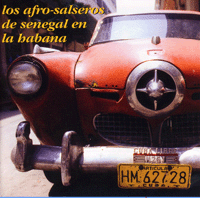
LOS AFRO-SALSEROS DE SENEGAL
EN LA HABANA (Popular African Music pam 407)
Orchestra Baobab added Ibrahim Ferrer to their line-up for one track on their return album SPECIALIST IN ALL STYLES, but Günter Gretz of Popular African Music went one better and accompanied a roster of great Senegalese salseros to Havana to cut an album. Unlike Africando, which was Senegalese singers fronting a band of Nuevo Yorquinos, LOS AFRO-SALSEROS DE SENEGAL EN LA HABANA is not a hybrid, but the best of Dakar's old-time salsa-mbalax musicians working out in the Communist playground. The credit actually goes to the Cuban ambassador to Guinée who invited these artists to come to Havana. Then local politicians stepped in and the list of invitees took on sinister overtones as names appeared and disappeared. Fortunately Günter Gretz was on hand to lobby for a real band rather than a delegation and thus got Issa Cissokho, sax-honking maestro of Baobab and Super Cayor, on the list. In the end however the trip wasn't such a treat for the musicians: In Cuba they had to play in hotel lobbies full of Japanese tourists who weren't listening to the music; not having dollars, the musicians couldn't buy a drink. When they got in the studio and started recording "Esta China," the engineer corrected Pape Fall's Spanish so much he switched to Wolof. There were attempts to sabotage the session, even bribes from a politician because he didn't want a German to have the rights to the recordings, but things worked out in the end and, for the first time, the old rivals from Baobab and Number One de Dakar collaborated beautifully to produce a monumental album. There's a real maturing of the sound here and it is indeed thanks to Gretz that we are now reaping these pleasures. This deserves to be as big as Buena Vista Socialism and if it gets a fair hearing it will be.
Thus members of four top Senegalese bands jammed on 8 classic songs that had all been hits in Senegal (as well as Cuba). First among the vocalists is Labah Sosseh (who sang with Dexter Johnson's bands in the 60s before his solo career). He performs his hit "Aminata." Issa does a great job with the sax lead and then arranger Yahya Fall from Number One de Dakar rips off a confident guitar lead. Next up it's Super Cayor's turn and James Gadiaga sings their hit about breastfeeding with a tune first heard on SOPENTÉ. Then Pape Fall gives us "Teungeuth" (which was heard on the Earthworks AFRICAN SALSA compilation), with the out-of-tune Egrem studios piano adding a really great lopsided momentum, particularly when playing with just the tama. Ousmane Diaw of Super Cayor on bass is incredibly brisk. Issa does a terse sax solo, then Ali Penda comes in on trumpet sounding a bit off-key like the piano. Also known as "Oh Coumba," this song was on Pape Fall and African Salsa's first release KE JARAXAM, released in 1995. After three listenings to the incessantly mad and insistent piano montuno part I can tell this is going to be top ten material for this year.
Mar Seck sings "Borom Gal" in a spirited version with speedy guitar and Ali Penda again soloing on trumpet. A crescendo is reached at the mid-point with Number One's "Diongoma" showing everyone deep in the pocket and a strident lead from Yahya. Another musical convergence occurs with "African Salsa" which has been reprised frequently since Pape Fall first hit with his own band. It was the lead-off track on the Earthworks compilation and is done to a turn here. The set ends with a coasting version of "El Manisero" (as I scream, Has it finally come to this!??!). I wish they had done "Diamoule Mawa" instead, but Labah Sosseh has a fine voice and as the senior of these singers probably got to pick the plum for this outing. It's another clean and clear recording, so this is the payoff for all the poorly recorded Senegalese cassettes we've listened to over the years!
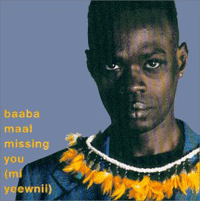
BAABA MAAL
MISSING YOU (Mi Yeewnii) (Palm Pictures CD2067-2 2001)
Making the global more local is on the mind of Baaba Maal, the Senegalese superstar, whose album MISSING YOU shows him getting back to basics, as he brings blind guitarist Mansour Seck to the fore again for a mellow evening. Kante Manfila also brings his acoustic guitar along for the trip upstream. The backing musicians are the tops: Kaouding Cissokho on kora, Lansine Kouyate on balafon, Aly Wargue on flute and a whole stack of Secks on percussion. This may disappoint fans who only know the electric pop albums, but anyone who has seen Maal in concert or followed him from his first quiet emergence with Mansour Seck will be thrilled by this low-key set. "Jamma Jenngii" is a direct descendant of the great sound of that earlier collaboration, DJAM LEELI from 1984, with its sampled voices and insect sounds giving atmospheric colour to the piece. The balafon romps in too under the sprightly jangle of the acoustic guitars.
One thing is clear from the overall feeling and the few snippets of lyrics included in the slick booklet: Baaba Maal is in love! Which is why, while he is sitting in Peter Gabriel's swank studios in Box, Wiltshire, he is wilting and wishing he was back in Podor with his sweetie. There's a melancholic ache to his voice and you can see it in his face in the liner photos. The songs are delicate but propelled on some tight percussion. Fulani folk music at its finest, MISSING YOU is a classic.
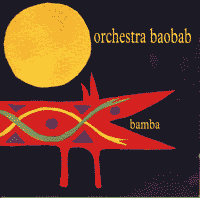
ORCHESTRA BAOBAB
BAMBA (Stern's STCD 3003 1993)
Baobab, the great Senegalese bar band of the late seventies, passed into legend over a decade ago, but with three recent CD reissues, each more incredible than the last, their reputation continues to soar. This CD presents back-to-back classic albums from the dance band who were rediscovered through the popular PIRATE'S CHOICE album. Originally released in 1980 and '81, these ten songs range from traditional Wolof melodies with great tama drumming to smoking Cuban sones, showing a danceable side to the haunting, bluesy band. Timbales and clarinet bring a broader range of sounds to the mix. Issa Cissokho's laid-back tenor sax is the perfect foil to the sprightly inventive leads of guitarist Barthelemy Attiso, and the two vocalists, Balla Sidibe and Thione Seck, complement each other with plaintive minor harmonies and luxuriate in catchy melodies. Seck's soulful vocals (treated with Echoplex), grab you from the first notes. Punchy horn arrangements and long uncoiling guitar solos (based partly on classical kora riffs, partly on early Santana) ride the flowing current of gentle rhythms.
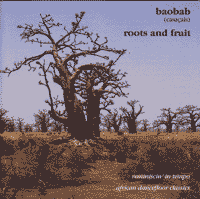
ORCHESTRE BAOBAB
ROOTS AND FRUIT (Popular African Music pam ADC 304)
Truly the greatest band ever to come out of the bustling, sprawling dusty city of Dakar, Senegal, Orchestre Baobab held sway at the nightclub for which they are named throughout the nineteen-seventies. Blending the Cuban influence that was popular in West Africa since the 1940s, with indigenous local forms which gained popularity throughout the sixties as "Authenticité" movements blossomed in the newly-independent countries. The band was formed from the Star band (which eventually gave birth to Youssou Ndour and his Etoile de Dakar) and recorded a dozen popular albums.
BAOBAB: ROOTS AND FRUIT is the fifth CD reissue of Baobab material. It provides a variety of musical styles and some superlative musicianship by Barthelemy Atisso on lead guitar, the smouldering sax stylings of Baro N'Diaye (a student of Dexter Johnson) or Issa Cissako, and the vocals of Balla Sidibé, Rudy Gomis, and Laye M'boup. The diverse cultural backgrounds of the members brings Mandinka music with traces of Guinean, Malian and even Togolese influences to the sound. In addition to the Cuban tinge on several numbers, and the mbalax style that is endemic to most Senegalese recordings since the seventies, there is a surprising lot of R&B, even echoes of Ethiopian pop in one sax solo (on "Saxaar"), reggae and ska in others. All this demonstrates the incredible range of the assembled members of Baobab. "Cabral" is based on the changes of "Guantanamera," and it's taken at a leisurely gate, characteristic of the Guinean bands of the 1970s who you can picture, leaning back against the wall or their amps, eyes closed behind shades, sweat spreading on their brightly patterned shirts, the cuffs of their frayed bellbottoms sweeping the floor.
Two of the songs on ROOTS AND FRUIT, namely "Tante Marie" and "Digone nga ma," were also recorded by the band in their 1978 Paris sessions which are available on Melodie 79559-2. The versions here are fuller, both in sound and in interpretation.
The most uncharacteristic song on this CD is "Toon baaxul" which starts with "one-drop" reggae drumming. It was a 1986 solo recording of Rudy Gomis who quit the band when they changed the line-up to add more percussion and try to lure more female audience members (who in turn would bring males). Atisso contributed the guitar part to this unusual song.
This CD is part of Günter Gretz's superlative series on the Popular African Music label of Frankfurt. Typically it has excellent liner notes, an indispensable discography to help you sort out what has been reissued and what hasn't, and historic photos of the band.
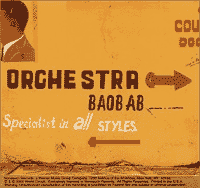
ORCHESTRA BAOBAB
SPECIALIST IN ALL STYLES (World Circuit PRCD 300894)
The brand spanking new Orchestra Baobab CD from World Circuit is a delight. It is their first recording together in 20 years. Nevertheless the band strolls through their repertoire in a confident manner. Recorded live over a ten-day period at Youssou Ndour's studio in Dakar, there are five vocalists and two guest appearances, from Ibrahim Ferrer and Ndour. Of course, the pillars of the sound are the smoky sax of Issa Cissokho & Barthelemy Atisso's lead guitar. There's a looseness and spontaneity to the sound, as if they are just getting their chops back together after the two decade hiatus, but that only adds to the preciousness of this recording. It's not tentative, but rather relaxed, and I'm glad they decided to make a spontaneous recording rather than overdubbing parts. I wouldn't want to hear a greatest hits package taken from their old recordings since many of those were low fidelity. We hear superb sound and subtle changes from the established versions of the songs, mainly in the tempos and the soloing, but now the congas are clearly audible. They kick off with "Bul Ma Min" from 1980 in a relaxed mode. The drummer, Mountaga Kouyate, remembers all his tricky fills from the BAMBA album, and Atisso gives us a reprise of his classic fast-picked solo.
After a track spotlighting Issa on sax, they launch into the spooky "Di moo wor" where the vocals and guitar creep around invoking ghosts, holding us in their spell. Atisso also brings out the Echoplex for his solo on "El son te llama," which does sound like it's double-tracked. He also goes wild ornamenting the background to "Utra Horas" on which Ibrahim Ferrer appears. It's faster than the original but you sense their excitement in getting to remake this one. Then (surprise!), along comes Youssou Ndour to add his pipes in contrast to the mellow baritone of Ferrer and Rudy Gomis's tenor voice. I'm sure there's no hard feelings, but Ndour and the mbalax sound was responsible for the failure of Baobab in 1982. One thing is certain, Baobab are back and will go on to great things and much-deserved wide acclaim with this new release and the supporting tour.
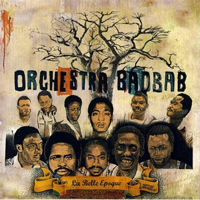
ORCHESTRE BAOBAB
LA BELLE EPOQUE 1971-77 (Syllart 000361)
I was like a homing pigeon on this release except the price kept bouncing me off it. I have said before there is definitely a market for the complete works of bands like Baobab, and hopefully one day someone will restore the sound, find the historic photos and write intelligent liner notes (I am thinking of John Storm Roberts, Samy Ben Redjeb, Miles Cleret & a very few others as examples here), and give us the definitive Baobab box. So I took my junk pile to Amoeba and got $24 in credit. But the CD was $28, plus another $3 in tax. Later I was cleaning my floor and found a $5 Amoeba credit slip under the bed. Still not enough. Then I remembered there's a $1 Amoeba coupon in the Yellow Pages! I added it up. Not enough. Then a friend suggested Amazon downloads. Amazon has a deal whereby you can download the whole album for $18, saving $10 off the retail price. No booklet, but still there's the music. I listened to the samples and they didn't sound like they had been remastered. I dug out my fistful of Baobab CDs. Turns out disc B contains the complete ten tracks of ON VERRA CA (The Paris Sessions, 1978, reissued by World Circuit in 92), so you don't need those again. I found I also had a dozen of the other tracks. Some were on AFRICAN CLASSIC (from Cantos, a.k.a. Classic Titles); others on A NIGHT AT CLUB BAOBAB (Oriki). I narrowed it down to ten I didn't have. I don't see the point in recreating the Sylla sequence (They didn't even get the dates on the title right). I have copies of the Disques Buur LPs but the sound is poor. Given, too, the changed spelling of titles and different timings on the tracks I wondered if some were edits or even different versions, but couldn't tell from the samples on Amazon. What I didn't have were the tracks from Senegalese cassettes, which you know are gonna be sonic shite, but there is one rare LP in the mix: BAO 02, with some Latin titles. I ended up with a 45 minute LP-length album for ten bucks. Sadly it doesn't really add up to an album able to stand alongside the other reissues. I did get one of the songs from VISAGE DU SENEGAL for comparison. It's "Bes bo amee" and I think my burn from an LP passed on from friends is probably the same source Sylla used, because it sure doesn't sound like it came off vinyl. There are even drop-outs making you think there's a defect. "El Vagabonde" reminded me of "Take these chains," but is probably based directly on a Cuban original because the lyrics are comprehensible. "Baila mi gente" is probably taken from Orquesta Estrellas Cubanas, and "El Nuevo amor" is a cha cha cha from Orquesta Aragon. The sound is generally awful on these ex-cassette tracks (all of disc one), but the execution is fine. Issa has a lot of echo on the sax. The guitar is not as prominent as we would like but Attiso steps up on "Juana," which is from the later Paris dates. The Paris session generated the songs that became their staples: "El son te llama," & "On verra ça," remade on SPECIALIST. Bottom line: If you are a Baobab fan you have the gist of this. If you are a completist you will be disappointed to find the best tracks are already in your collection.
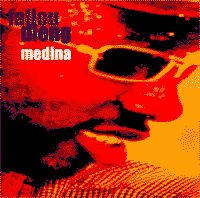
FALLOU DIENG
MEDINA (Sterns 1090 2000)
The pure mbalax sound can be heard on Fallou Dieng's MEDINA. It sounds a lot like old school Youssou and Etoile de Dakar from their PG (Pre-Gabriel) heyday. The tama and sabar drums are prominent on this collection of songs drawn from four cassettes recorded by Dieng and the DLC band over a four-year period. While other Senegalese bands are adopting synthesizers, Dieng insists on having real brass and features Thierno Koïté on sax (he recently played on Cheikh Lô's BAMBAY GUEEJ). Some veterans of Super Etoile contribute to the album and even Youssou's sister-in-law sings backing vocals. The song "Koleuré (Gratitude)" would fool most people into thinking it was a Youssou song. But MEDINA is not a derivative album, it's just straight-ahead funky mbalax.
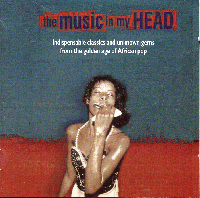
VARIOUS ARTISTS
THE MUSIC IN MY HEAD (Stern's)
THE MUSIC IN MY HEAD is the title of a book and a CD. The novel was written by Mark Hudson and published by Jonathan Cape. It is a tour-de-force about the first white guy to get to Youssou Ndour and all that followed, from early recognition to big deals with Peter Gabriel and the like (all appearing in thinly veiled disguise). That book is a must-read. The companion CD which was accurately subtitled "Indispensable classics and unknown gems from the golden age of African pop," is rooted in Senegal, with Franco and OK Jazz making a guest incursion. It provides a glimpse into West African pop from an insider's point of view. By now you probably have other compilations or collections of the artists on here, Number One de Dakar, the acid tones of early Etoile de Dakar, Thione Seck and Salif Keita, but these are neatly sequenced gems. And among all the Etoiles, don't overlook the truly stellar Etoile 2000 tearing through "Boubou n'gary." The El Hadji Faye and Pape Seck tracks are their best; the CD is as brilliantly coherent as Hudson's novel. Though the emphasis is on the buzzed, most rocked-out tracks we still hear snatches of balafon and kora in the mix.
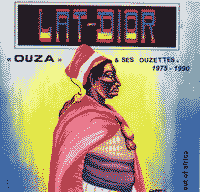
OUZA & SES OUZETTES
LAT-DIOR (Popular African Music pam oa 208)
LAT-DIOR is a compilation of classic tracks from OUZA & SES OUZETTES from 1976-90. It takes a couple of hearings to get used to the Islamic harmonies, but anyone into the classic Senegalese sound of Baobab and Star Band will gravitate to this. Plus you can trust Günter Gretz to come up with the goods. Here he has combed through Ouza's output (4 LPs, plus two 7" singles from the seventies, and 14 cassettes spanning the eighties and nineties) to deliver another classic. The first few cuts are drawn from a 1990 session with squirty synth but a tasty Wes Montgomery-style lead guitar by Oumar Sow and a quartet of female singers (Les Filles Branchées) that yielded the cassette "Ndar." By the fourth track, the magical ten-minute long "Guajira," we are in the sweet tropical air of the Afro-Cuban night with a brace of saxes and Pape Seck on guitar, among others. The heart of this new PAM release is this session from 1982 with all four tracks of the "Nakhe M'baaye" cassette included where the band covers all styles including speedy mbalax with flanged guitar, tama, and the delightful addition of acoustic piano.
There is a complete discography and liner notes by Gretz who tells us of the controversy of Ouza's politics in his many songs, and various bands formed by Ouza including one with Baaba Maal in the early eighties. He also notes that there is an exceptional album called "Ouza et les 4 femmes dans le vent" featuring four women singers who went on to solo prominence in Senegal. "Wherever you find it buy it. The sound is poor. I have tried in vain to find the master," Gretz adds parenthetically, indicating the kind of effort he puts into his productions.
Two of the LPs in the discography were the source for ten tracks on the Senegal Flash series that Syllart put out around 1993, so have not been included here. But one track from WETHE has been included, the slow rocker "Senegal 80" with its familiar "Hang on Sloopy" 12-bar stroll. Another of the tracks, "Thiaroye," is an important song because it discusses the French massacre of Senegalese troops after World War II. Despite its sympathetic message, it led to censure by President Senghor. (You can find it on SENEGAL FLASH-BANJUL).